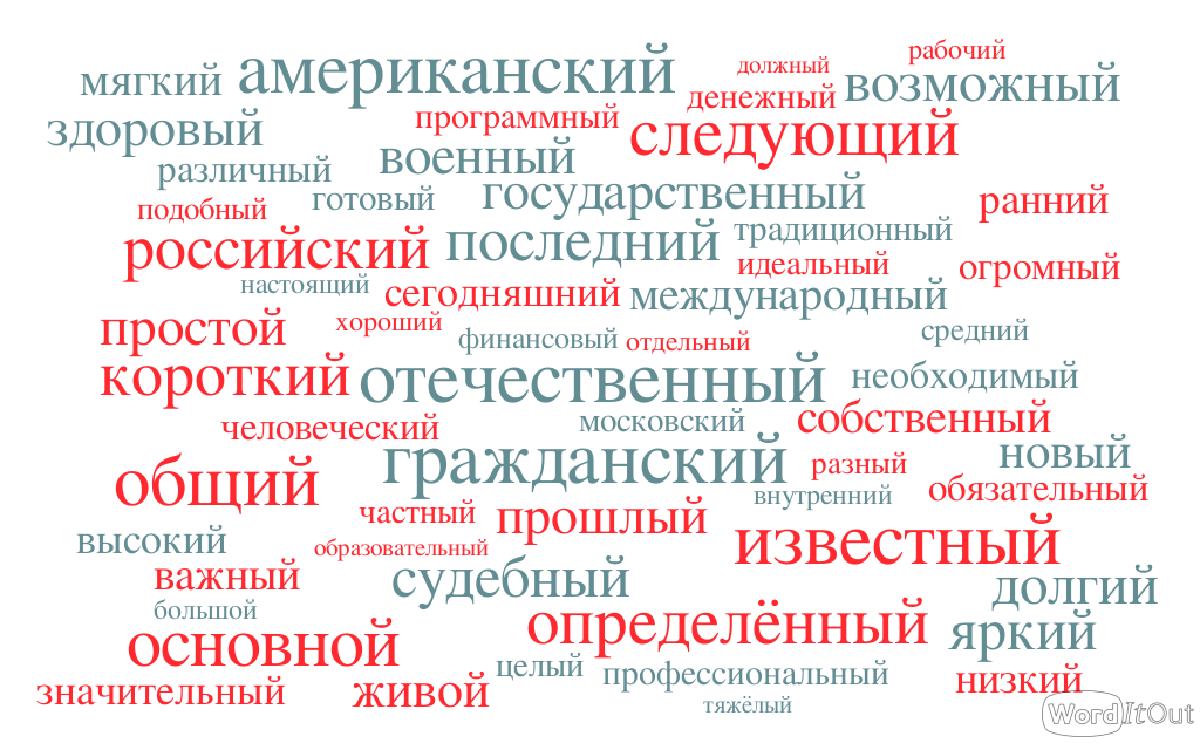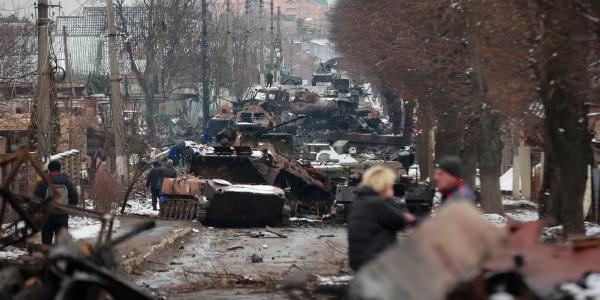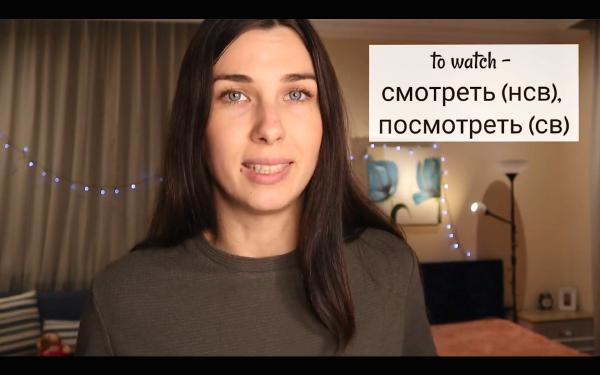Russian Adjectives (Прилагательные)
Useful, convenient, interesting: adjectives are everywhere and unavoidable. So it is sensible, rewarding, fascinating, attractive, necessary, etc., to be able to use them in speech and writing. Two things are needed for that.
Declensions
Flexible
First, you need to know how to decline them. Russian adjectives are flexible: they adapt to the gender and number of the noun they modify. New text, new idea, new morning, new plans: новый текст (m.), новая идея (f.), новое утро (n.), новые планы (pl.).
24 possibilities
These four categories (masculine, feminine, neuter, plural) multiplied by six cases would mean 24 options for each adjective. And that’s mostly true—yet not exactly, because many forms are identical. But it’s also true in the sense that within each of the 24 options, there are two or more possibilities.
| masculine | feminine | neuter | plural | |
|---|---|---|---|---|
| Nom. | -ый, -ий, -ой | -ая, -яя | -ое, -ее | -ые, -ие |
| Gen. | -ого, -его | -ой, -ей | -ого, -его | -ых, -их |
| Dat. | -ому, -ему | -ой, -ей | -ому, -ему | -ым, -им |
| Acc. | -ый, -ий, -ой / -ого. -его | -ую, -юю | -ое, -ее | -ые, -ие / -ых, -их |
| Ins. | -ым, -им | -ой, -ей | -ым, -им | -ыми, -ими |
| Loc. | -ом, -ем | -ой, -ей | -ом, -ем | -ых, -их |
Which form you use depends on hardness/softness, stress, and spelling rules. For more on this, see Adjectives and Spelling Rules (Russian grammar, 2015, 3 mins) and (from the same channel) The Letters of the Three Spelling Rules of Russian (2013, 2 mins).
You may want to first watch Adjective Agreement in Russian (Nominative) (Russian grammar, 2013, 7 mins) and Adjectives. Adjective-Noun Agreement (Amazing Russian, 2017, 24 mins). For beginners, understanding these forms in just the nominative case is already quite an achievement.
Hard and soft
The grammar behind hard/soft stems can be easily bypassed or made less urgent. There aren’t many soft-stem adjectives, and you’ll quickly recognize them. They often describe time or place. Memorize these, and you’ll already be quite far along:
- ближний (near)
- верхний (upper/high)
- весенний (spring)
- вчерашний (yesterday’s)
- дальний (far)
- домашний (home)
- завтрашний (tomorrow’s)
- зимний (winter)
- летний (summer)
- нижний (lower)
- осенний (autumn)
- передний (front)
- поздний (late)
- последний (last)
- ранний (early)
- сегодняшний (today’s)
- синий (blue)
- средний (middle)
See also Hard-stem and Soft-stem Adjectives (RussianDict).
More
- How to agree adjectives with nouns in gender (Russian with Aurora, 2019, 9 mins)
- Russian adjectives – Tutorial (R for Russian, 2018, 14 mins), from the same channel Russian Music with Adjectives (2018, 31 mins)
- Online Russian Classroom: Gender of Adjectives (College Russian, 2018, 10 mins)
- Russian adjectives – Russian language course (Real Russian Club, 2018, 41 mins)
- Russian adjectives and their endings, declension of Russian adjectives (A. Romaker, 2018, 20 mins)
- Cases of Adjectives | Russian Language (Be Fluent in Russian, 2017, 7 mins)
- Adjectives. Russian grammar (Ru-Land Club, 2014, 8 mins)
Vocabulary
Grammar rules are useless without something to apply them to. So, build your vocabulary. How you do that is a topic in itself, but adjectives offer specific opportunities for practice.
Opposites
Learn adjectives in pairs that are opposites. Cold/hot, dark/light, good/bad, etc. You’ll remember them better – the words serve as reminders for each other – and you’ll learn twice as much. See Russian Antonyms.
Labeling
Label everything you see and encounter. Thin/fat, young/old, beautiful/ugly, big/small. It works with objects and people, the latter being the most fun. Just say it out loud—they probably won’t understand you anyway. Most likely.
Watch 8 Adjectives For Describing People In Russian (Russian With Max, 2018, 7 mins) and How to describe appearance in Russian – Advanced Adjective Vocabulary Lesson (Daria Mikhay, 2018, 12 mins). See/read Describe People in Russian (Rocket Languages) and Russian Adjectives List. 50 Adjectives for Personality (Linguajunkie).
Colors
For describing objects, you’ll need words for colors. Check out Reviewing Adjectives of Color in Context: Какой? Какой цвет? Какого цвета? (Amazing Russian, 2020, 17 mins), Russian vocabulary – Colours (Learnrussian.org, 2017, 5 mins), and Russian Lesson – Learn colors in context (Russian in Context, 2013, 5 mins).
For learning adjectives, also see How to Learn a Lot of Adjectives with Minimum Effort (Amazing Russian, 2019, 12 mins) and Learn Russian adjectives: memorize 6 words in 5 minutes! Russian antonyms (Anna Cher, 2017, 5 mins).
More
See
- Top 50 Russian adjectives that you should know (Easy Russian, 2020, 7 mins)
- 100 Most Used Russian Adjectives with Pictures (Russian with Nastya, 2020, 14 mins), from the same channel 25 Russian Adjectives you must know (2020, 10 mins)
- 20 most used Russian adjectives & adverbs (LRW Alfia, 2019, 16 mins)
- Russian adjectives in nominative (Easy Languages, 2019, 5 mins)
- Top 15 Russian Adjectives (Be Fluent in Russian, 2017, 5 mins)
- Russian vocabulary – Adjectives (Learnrussian.org, 2017, 6 mins), from the same channel How to make adverbs from adjectives? (2018, 6 mins)
- 90 Russian common adjectives reading (Denis Fedorov, 2016, 6 mins)
- Learn the Top 25 Must-Know Russian Adjectives (RussianPod 101, 2015, 12 mins)
See/read
- 10 Russian adjectives describing size (Learn Russian Words)
- Adjectives in Russian (Master Russian), also see Declension of Adjectives
- Declension of Russian adjectives (Learn Russian Step by Step)
- Declensions of Russian Adjectives (LRW Masha)
- How to Use Russian Adjectives in Any Situation (FluentU)
- Russian Adjectives (My Languages)
- Russian/Grammar/Adjectives (Wikibooks)
- Those Agreeable Russian Adjectives! (Alpha Dictionary)
- Прилагательные (PS Russian)
Last updated 23-12-2020
More








